The Community-Wide Food and Goods Rescue Initiative : Combatting Waste within the Community
The Community-Wide Food and Goods Rescue Initiative is a collaborative project addressing the environmental, social, and economic challenges created by food and goods waste. Globally, around 20% of all food produced ends up in landfill, and alarmingly, up to 70% of this food is still perfectly edible. When food decomposes in landfill, it releases methane, a greenhouse gas 28–36 times more potent than carbon dioxide, making food waste a significant contributor to climate change.
By rescuing surplus food and goods and redistributing them within the community, the initiative reduces environmental harm while supporting individuals, households, and local organisations.
Understanding Food Waste Across the Supply Chain
Food waste occurs at every stage of the supply chain:
-
On farms (24–30%) due to overproduction, harvesting losses, and cosmetic standards
-
Post-harvest handling and storage (15–20%) resulting from poor storage and transportation conditions
-
Processing and packaging (5–10%) caused by trimming and the disposal of substandard items
-
Distribution and retail (10–15%) where unsold products frequently go to waste
-
Consumer level (35–40%) driven by over-purchasing, improper storage, and over-preparation
Our Mission: Reducing Waste and Supporting Communities
The initiative was launched to tackle food waste at the distribution and retail levels while improving community access to food and reducing environmental impact. The programme aims to:
-
Reduce food and goods waste
-
Minimise greenhouse gas emissions
-
Improve community wellbeing and access to food
-
Promote sustainable and circular use of resources
In addition to food, the initiative rescues surplus non-food goods, including paints, plants, tiles, and other home improvement materials.
Partnerships and Food Rescue Operations
The Dunn School Green Group and the Community-Wide Food and Goods Rescue Initiative partner with FareShare and Neighbourly, organisations that connect initiatives like ours with local retailers. Through these partnerships, surplus food is collected from stores including Marks & Spencer, Tesco, Sainsbury’s, Aldi, Lidl, and KFC.
This includes:
-
Use-by-same-day items from Marks & Spencer and Tesco
-
Best-before items from Sainsbury’s, Aldi, Lidl, KFC, and Tesco
Volunteer Network and Operations
The success of the initiative is built on collaboration and collective action. The initiative’s achievements are the result of a truly collective effort of over 100 volunteers including students and staff of the Universities. They coordinate pick ups, collecting, sorting, and redistributing surplus food and goods. Volunteers are encouraged to keep what they can use and distribute the remainder within the community.
Impact and Achievements
Between October 2023 and December 2025, the Community-Wide Food and Goods Rescue Initiative in Oxford achieved the following:
-
Environmental impact: 184 tonnes of food rescued and 295 tonnes of CO₂ emissions prevented
-
Social impact: Rescued food and goods supported individuals and families across the community
-
Community impact: Strengthened connections and encouraged shared responsibility and collective action
Join Us: Get Involved
If you are passionate about reducing food waste, promoting sustainability, and making a positive impact, we invite you to volunteer with the initiative and be part of the movement towards a greener, more sustainable community.

Room temperature best before surplus food from the supermarkets in the Eco Zone.

Room temperature best before surplus food from the supermarkets in the Eco Zone.

Plants from B and Q

Room temperature best before surplus food from the supermarkets in the Eco Zone.
